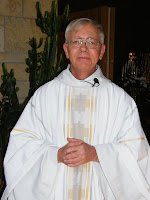 Readings: Acts 5:12-16; Rev 1:9-19; John 20:19-31
Readings: Acts 5:12-16; Rev 1:9-19; John 20:19-31When we listen to these readings this second Sunday of Easter, we have to be amazed at the remarkable reversal from the Holy Week readings. There for an entire week, except for that moment of special intimacy at the Last Supper, everything was hostility and conflict, anger and rage, passion and sorrow, betrayal, crucifixion and death. Then we come to all the readings of this past Easter week and they just bubble with joy, enthusiasm, hope, happiness and peace. The change, of course, comes because of the Resurrection of Jesus and its reversal of almost everything.
Without doubt the followers of Jesus underwent a tremendous, life-changing experience that completely transformed the fear and despair that followed Jesus’ capture, crucifixion and death. And it was not just the ones who said they saw or "experienced" the Risen Jesus, but those were able to convince others of the same thing as well—that Jesus is risen and this gives a whole new meaning to human life and a whole new relationship with God. Perhaps the most amazing aspect about early Christianity is how quickly it spread throughout the Roman Empire, basically its whole extent in about seventy years. And all this was accomplished by word of mouth. Those early Christians were "on fire," and they gathered many other believers by the power of their convictions and their way of life. This new Christian message held both a promise of eternal life, but also a very practical, loving way of life here and now. Sometimes that last was just as important as the promise of eternal life.
The Christian church in the 2000 years since then has gone through many evolutions and changes from those first little groups of believers who gathered in private homes "to hear the teaching of the apostles" and partake in the "breaking of the bread." In 2010 we live now in a world-wide, incredibly complex institution that is the "Roman Catholic Church." The very breadth of its institutional parts is mind-blowing to anyone who sets about to study them. (You just have to look at the Annuario Pontificio) The complexity of its historical beliefs defies the efforts of any single individual to master them. Sometimes just the size itself of the church overwhelms believers. As a two-millenia old institution it carries not only its basic faith and its many institutional appendages, but also a lot of its personal and institutional failures, as we are all too well aware of in these days. Today we have to live with something that those early Christians did not—the accumulated sins and offenses of believers. Those are trumpeted in the news media almost everyday.
The announcement of the Resurrection and the celebration of the feast is therefore a call for each of us to purify our own living and practice of our Christian faith. It reminds us to make sure that our own faith is rich and vibrant. The Church has a lot of institutional baggage; some of it is needed to carry on the basic message; a lot of it isn’t. It’s very easy to get caught up in endless argument about the baggage. The Easter season is a call to return to a living faith that burns in our hearts. That means going back to the essentials—the essentials we heard in today’s gospel passage: peace, the gift of the Spirit and forgiveness.
It seems there are times when we have to go through some of the "fear and despair" that the disciples of Jesus did. We can get awfully discouraged at times by things that happen in the Church and under the guise of religion. (Consider NBC’s series, "Twisted Faith") It is comforting to go back to Jesus’ wish and offer of Peace for his disciples. He repeated it a second time: "Peace be with you." Peace is Jesus’ gift to us, but we have to open our hearts to receive it. We do so by allowing the Spirit to work in and through us—through mercy, service and forgiveness. Then we shall know the peace of Jesus. We should always remember that in the midst of this incredibly convoluted religious situation of the world today, Christ’s first gift to us is Peace. "He said to them again: ‘Peace be with you.’"
No comments:
Post a Comment